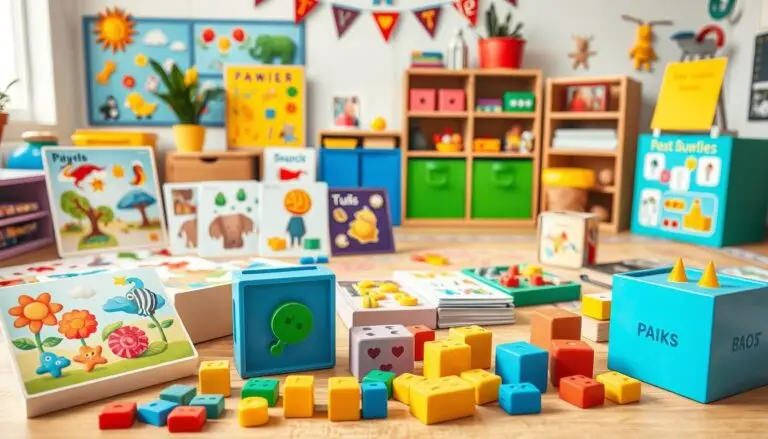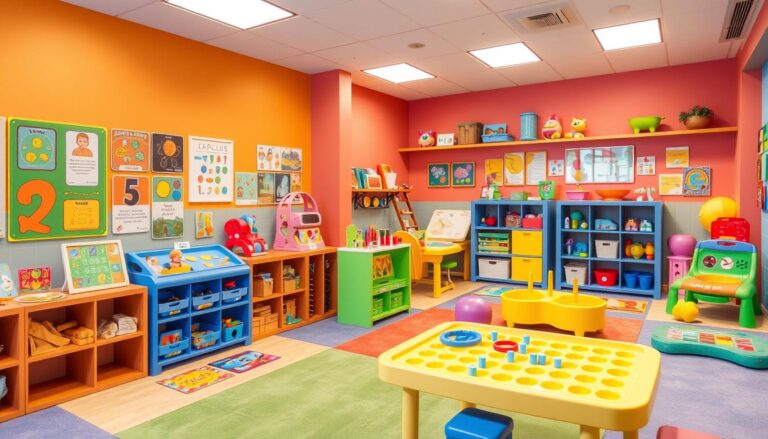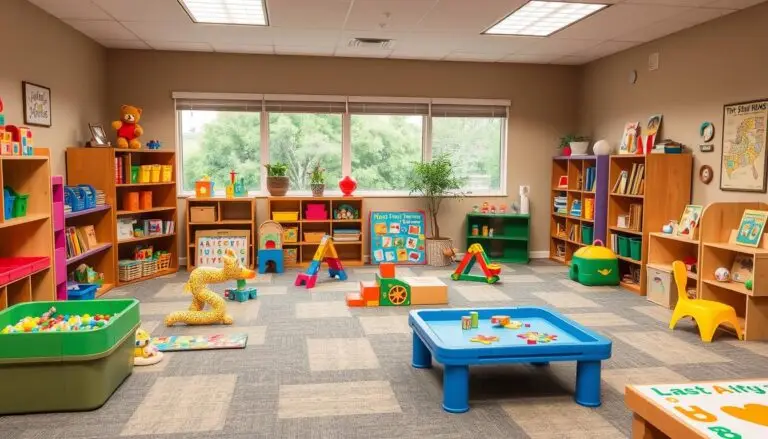Educational Games for Special Needs Children A Guide
Educational Games for Special Needs Children A Guide
Education is always changing, and so is the need for learning experiences tailored for children with special needs. This guide looks into educational games that help kids grow and learn. It covers a wide range of activities, from sensory to cognitive and social-emotional ones. Parents and caregivers will find many engaging tools to help their child learn.
Play is key to a child’s development, and educational games make a big difference for kids with special needs. This article shows how games can meet the unique needs of this group. It helps parents find games that fit different learning styles and stages. If your child faces challenges like autism or Down syndrome, this guide will show you how to make playtime both fun and helpful.
Key Takeaways
- Educational games can significantly support the learning and development of children with special needs.
- This guide explores a wide range of game types, including sensory, cognitive, and social-emotional activities.
- Selecting appropriate games requires considering the child’s age, developmental stage, and specific needs or abilities.
- Inclusive play resources can foster an enriching environment that nurtures the growth and success of children with diverse abilities.
- Parents and caregivers will discover a wealth of tools and strategies to engage their children in meaningful, educational play.
Understanding Special Needs and the Importance of Play
When we talk about child development, “special needs” covers many conditions like autism, Down syndrome, and more. These kids need special support and learning methods to reach their full potential. Play is key in helping them grow and learn.
Defining Special Needs
Children with special needs might struggle with things like talking, making friends, handling senses, or moving. They need careful support and strategies to fit into school and social life. Knowing about their special needs helps teachers and parents make a welcoming space for each child.
The Role of Play in Child Development
- Play is vital for all kids, including those with special needs.
- Playing with sensory games for kids and inclusive play resources helps them learn important skills. These include:
- Better sensory skills
- Improved thinking abilities
- Stronger feelings of social and emotional well-being
- Using special education games daily lets kids with special needs dive into their interests. It helps them feel more confident and part of a group.
Seeing how crucial play is for kids with special needs is key to making a supportive and welcoming place. This helps them do well.
Types of Educational Games for Special Needs Children
Exploring educational games for special needs kids is a rewarding journey. These games help with a variety of skills, like sensory processing, thinking, and social skills. Let’s look at the different types of games that support kids with disabilities, autism, Down syndrome, and other special needs.
Sensory Games
Sensory games are key for kids with special needs. They use senses like sight, sound, touch, and movement. This helps kids with autism or sensory issues improve their sensory skills.
Cognitive Games
Autism games and down syndrome educational activities boost brain skills. They help with solving problems, remembering things, paying attention, and more. Educational apps for special needs often have games made just for these skills.
Social and Emotional Games
Games that help with social and emotional skills are important. Educational games for children with disabilities focus on making friends, managing feelings, and being happy. They teach kids to play together, understand others, and handle tough times.
Knowing about the different educational games helps parents and teachers pick the best ones. They can find the right learning games for children with disabilities, autism games, down syndrome educational activities, and educational apps for special needs for each child.
Selecting Appropriate Educational Games
Choosing educational games for kids with special needs is important. We must think about their age, developmental stage, and what they can do. This way, the games will not only keep them interested but also match their learning needs.
Considering Age and Developmental Stage
It’s vital to pick games that fit the child’s age and development level. Games that are too hard or too easy can cause frustration or boredom. By looking at the child’s age and development, we can find games that are just right. This helps the child feel successful and keeps them interested.
Matching Games to Specific Needs and Abilities
Every child with special needs is different, with their own strengths and challenges. When picking educational games, we should match the game’s features to what the child can do. This might mean looking at the sensory input, the complexity of the tasks, and how much social interaction there is. Using adaptive learning tools, we can find games that really meet the child’s needs, making learning better.
By thinking about the child’s age, development, and needs, we can pick games that are engaging and supportive. This approach to choosing games makes sure the adaptive learning tools and matching games to specific needs and abilities work well. This leads to a more fulfilling and effective learning experience for the child.
Educational Games for Special Needs Children: A Complete Guide for Parents
As a parent or caregiver of a child with special needs, finding the right educational games can seem tough. This guide aims to give you the tools and strategies to use these games well in your child’s learning. By learning about the importance of play, exploring different games, and picking the right ones for your child, you can make learning fun and helpful.
Educational games are key for kids with special needs. They help with sensory awareness, thinking skills, and social skills. With this knowledge, you can start exploring educational games more deeply. You’ll see how they can help your child grow.
This guide will help you find the best educational games for your child. Think about their age, what they need, and what they like. By doing this, you can make playtime fun and helpful for your child. Educational games can change the way your child learns and grows, celebrating their strengths and supporting their development.
FAQ
What are the benefits of educational games for children with special needs?
Educational games help children with special needs in many ways. They improve sensory skills, boost thinking abilities, and help with social and emotional growth. These games also make learning fun and support child development.
How do I choose the right educational games for my child with special needs?
Choosing the right games means thinking about your child’s age, where they are in development, and what they need. Look for games that match their abilities and help with specific skills. This could be thinking, social, or emotional skills.
What are some examples of different types of educational games for special needs children?
There are three main types of educational games for special needs kids. Sensory games help with sensory skills. Cognitive games work on solving problems and thinking. Social-emotional games help with making friends and managing feelings.
How can I adapt educational games to better meet my child’s needs?
To make games more suitable for your child, you can change the difficulty level or add support. Adjusting the sensory input can also help. This makes games more engaging and accessible for your child.
Where can I find resources for educational games and activities for children with special needs?
You can find resources online and offline for educational games and activities. Look for specialized websites, apps, therapy services, and local groups. These can lead you to many inclusive and adaptive learning tools for your child.






